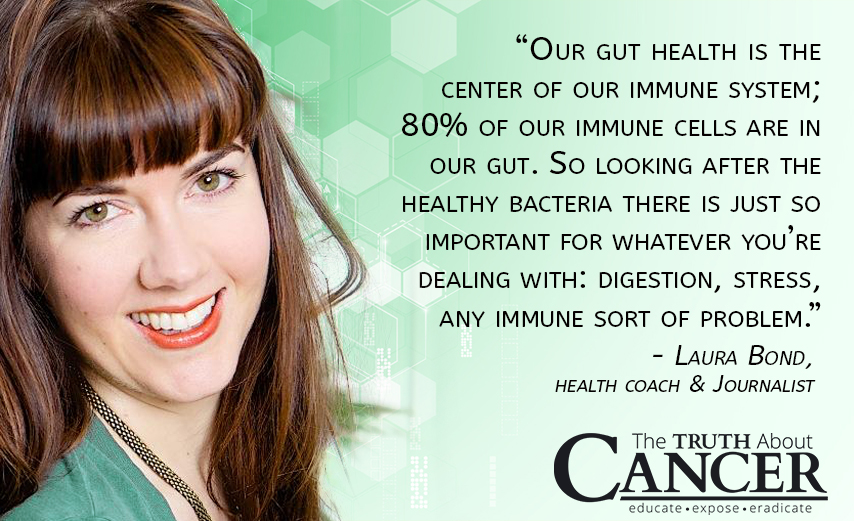Video Transcript: Why is Sauerkraut the New Superfood?
Ty Bollinger: You mentioned superfoods. I’m going to ask you a question. I hope you can answer this. Why is sauerkraut the new superfood?
Laura Bond: Sauerkraut is the new superfood because it’s wonderful. A spoonful of sauerkraut delivers trillions of probiotics and enzymes, which are just so powerfully anti-cancer.
Our gut health is the center of our immune system; 80 percent of our immune cells are in our gut. So looking after the healthy bacteria there is just so important for whatever you’re dealing with: digestion, stress, any immune sort of problem, which cancer, of course, is.
I came across an interesting article recently though, from the University of Michigan, and it was showing that healthy bacteria can help you get through chemo. I think the article was titled “Gut Reaction: Mice Survive Lethal Doses of Chemotherapy.” And they’re talking about how important this healthy [gut] bacteria is.
So great for people going through chemotherapy. Great for anyone. I mean, I have a lot of people that come to me and they get bloated all the time. They’ve got digestive issues. And they might have cut out dairy, they might have cut out gluten, but they’re still sitting at their desks getting a horrible bloated feeling. And so often it’s because of a lack of enzymes in their diet and too much stress. But so having, you know, say a tablespoon of apple cider vinegar, or a scoop of sauerkraut before you start eating gets those digestive juices flowing.
Ty Bollinger: So that’s something that can be really practical for everybody that’s watching this. Sometimes you go to buy enzymes or probiotics − they’re very expensive. But you can make it on the cheap with sauerkraut. So explain to somebody real quick how they might make some sauerkraut that has all of these enzymes and probiotics.
Laura Bond: Okay, well, to be honest with you Ty, I’m a bit lazy. I make my own almond milk, I make my own juices, but there’s only so much you can do, so I haven’t actually. I’ve tried my own kimchi. I haven’t made my own sauerkraut, but I do know that all it involves is salt and cabbage. And you know, you can press it, the cabbage shrinks a little, and then you can just keep it for a couple—I think for about two and a half weeks is about how long you need to wait for all those healthy bacteria to start proliferating.
Ty Bollinger: Right.
Laura Bond: Because basically, cabbage contains those bacteria naturally on the cabbage leaves. And then when you’re salting it and preserving it, you’re bringing all those to the fore.
Ty Bollinger: Right. Well, you just did a great job of explaining it even though you say you didn’t understand how to make it. It’s salt and cabbage. You let it sit for a couple weeks, you keep pressing it down, and you’ve got the sauerkraut.
Laura Bond: Exactly, yeah.
Ty Bollinger: It’s very inexpensive.
Laura Bond: It’s very inexpensive. I mean, I guess I’m lazy with that one because my organic supermarket, for a pound-fifty—you’re getting about the same price—for $3 you get a delicious jar. There’s a brand I really like. So I have it with eggs, because it’s got that sort of acidity that’s quite nice. Put it on top of salads. It’s a great thing. [I] have it daily.
Ty Bollinger: Now the Germans eat it on top of hot dogs. I guess if you’re getting a hot dog that’s no nitrates and no preservatives that would be okay. You don’t want to put it on top of a hot dog from the supermarket.
Laura Bond: No. But it’s interesting you say that though, because the healthy bacteria in the sauerkraut—it’s great if you are having a barbecue or whatever, because it’s said to offset those cancer-causing compounds that you get from cooked meat.
Ty Bollinger: The HCA.
Laura Bond: Yes, exactly.
Ty Bollinger: Right.
Laura Bond: So it’s great to have around at a barbecue. Any sort of pickled food − really, really good for that.
Ty Bollinger: Yeah, it’s funny that you mentioned that, because last week we were in Atlanta, Georgia. And we were sitting at a table with about 10 or 12 guys. And one of the men there was Dr. David Jockers, who we interviewed for “The Quest for the Cures.”
Laura Bond: Oh, fantastic.
Ty Bollinger: Now, we ordered—it was a completely organic restaurant, and so we ordered some hot wings. Now they came out, and some of them had the black on them, which is the HCA, heterocyclic amines. Now what we did before we ate them though, is we drank this shake that contained probiotics, enzymes, ginger, and a bunch of other compounds that offset the heterocyclic amines. So you can actually eat it, without having the carcinogenic effect, if you drink the shake first.
Laura Bond: First. Offset the guilt.
Ty Bollinger: So there are things that you can do to offset it, right? Yeah.
Laura Bond: I love hearing about these tips, because people want to live a normal life. They want to be able to enjoy their favorite things.



















Thanks a lot Laura- met you in our Farmer’s Market last year and have been ,meaning to get in touch! We people interested in cansurviving have a lot to do but gut health is crucial- there’s a good sauerkraut recipe on the site- cansurvivors untie….will mail you too…
well that should have read cansurvivors unite NOT untie!!! Fingers slipping again….
Dr Budwig in her Oil Protein Diet for curing cancer had her pafients drink a glass of sauerkraut every morning on an empty stomach.
I have a histamine sensitivity so sauerkraut and apple cider vinegar would really bloat me up as well as scramble my brain. Think I’ll stick with my probiotics, thanks.
What is the exact recipe for the sauerkraut? How much cabbage and salt should I use? Are there other ingredients? What sort of jar do I preserve it in? Do the ingredients have to be organic?
Cabbage, organic is better but not necessary, pure salt, (not iodized because that will kill off the good bacteria) and purified water (water run through an activated carbon filter like your fridge or even distilled water can be used). Take off the hard, outside leaves of the cabbage. Wash the cabbage to remove any dirt. Shred it and salt it (use between 1 – 2 tbsp. of salt given how big your cabbage head is. The more salt, the longer it could take to ferment but you don’t want too little, either. Then take the salted, shredded cabbage and work it with your clean hands in a bowl. It will start to wilt and release juices. Pack the salty, wilted cabbage with its juice into mason jars or a really big jar and fill it with water leaving a little headroom for fermentation. Cap it tightly and set it in a cool place away from direct sunlight. Release the pressure daily and start tasting it after two days. You can let it ferment for as long as you like before putting it in the fridge and it’s safe to eat from day zero, so taste it day by day and see when it’s good enough for you. Then put it in the fridge and it will keep until you finish it up. You can also add garlic, peppers, carrots, whatever you’d like. Experiment! I may try fermenting some fresh beets, I hear they’re great and the bacteria eats up all the sugars.
Excuse me it’s not 2 weeks [that’s the shelf life] it’s more like a few days until it’s ready… ? Don’t need a lot of salt rather a bunch of celery for the sodium only is needed to ferment .A ‘starter culture ‘also, can make the vitamin K2 content over 300 mcg/4 ounces [From Marcela.com]
*That’s Mercola.com excuse me.
THANKS FOR ALL THIS GREAT ADVICE….THE MEDICAL PROFESSION AND DOCTORS ARE NOT HAPPY…BUT I AM..THANKS AGAIN..
GOOOO SOUR KRAUGHT….
Hi everybody there,
Can anybody tell me if saurkraut can rebuild my seriously damaged (due to antibiotics) gut flora?
I really need tips ? whatever I did…. did not help.
Hi Farangis,
I’m no gut health expert, I must clarify first. However, after many years of taking an interest in gut health and taking in lots of information, I’ve realised it’s not so much about any mysterious probiotic strain or other kind of amazing gut product on the market. It all comes down to something very simple, and that’s …. eating ! Eating a diverse range of healthy foods. The more diverse, the better, because the bacteria in our gut are many and varied, and all thrive on a wide variety of foods, with the fibres and nutrients contained therein. Apparently one can improve their microbiome within only a few days, by simply eating a range of healthy foods. Think about which foods you might add to your existing diet, each day. They don’t have to be fancy or complicated. A few olives, nuts, seeds, vegetables (cooked and raw), fruits, …. dark chocolate, gherkins, herbs, avocados, eggs, cheeses, etc, to name a few basic ideas. I haven’t mentioned grains and beans etc, because I’m not sure about them. I don’t eat wheat and such, because its protein (gliaden) damages the gut mucosa, leading to all kinds of health problems. Beans require special treatment, like soaking, before eating. It’s worth researching a bit, before eating beans and legumes etc. I hope this helps. Good luck !
I was excited to see an article on sauerkraut since I am a huge advocate for fermented foods. I constantly have jars of sauerkraut fermenting; my three small children love it as much as I do! I was overall quite disappointed in the content though, as it appears Ms. Bond had little knowledge on the topic. If an interviewee is purported to have special knowledge on the article topic, I expect to see that reflected in the information. Even making my own ferments and having done a moderate amount of research on the topic, I still would not consider myself an expert. In comparison, however, Ms. Bond appears to be a complete rookie. The article really neglected to highlight the specific reasons why sauerkraut is anti cancer, and the components that promote health. A blanket statement of “supports gut health where 80% of our immune system is” is vague and uninspiring!
It would have helped to interview someone with a bit more knowledge on the subject than this lady seemed to have. An exact recipe and procedure were never given. Obviously you need to start with an ORGANIC cabbage — should it be red or green? — do you wash it, or does that wash off the natural yeasts or whatever is on the leaves that starts the fermentation? Many people are on salt restricted diets, so this wouldn’t be good for them. Good tip above about the celery. And finally, many store-bought sauerkrauts are quickly manufactured by just soaking cabbage in vinegar, thus artificially arriving at the sauerkraut taste without the benefits (or maybe with other benefits?) And sauerkraut from a tin would be a really bad idea, with or without BPA lining the tin, as acid and/or salt draw BPA and metals from the tin. As so often, this is a very superficial article without enough actual detail about how to do it right.
Youtube it